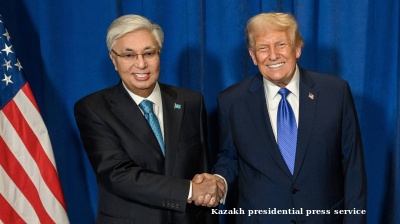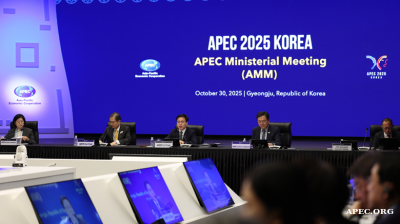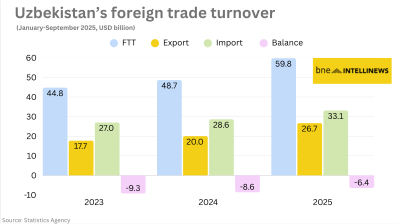Local retail champions in Uzbekistan are expanding as the ongoing reforms create new opportunities — and as a defence mechanism in the face of competition from international players attracted by the opening up of Uzbekistan’s economy.
The figures speak for themselves, Zafar Khashimov, the founder and CEO of retail chain Korzinka told a conference in Tashkent on November 15. By mid-2016, after two and a half decades of operations, Korzinka had a total of 21 stores across the country. Just three years later, the number has more than doubled to 50.
“Activity [in the retail sector] was liberated after the removal of probably the most strict regulations. The newly introduced tax reforms are also fuelling these changes,” Khashimov told delegates at the international conference The Role of Capital Markets in economic development of Uzbekistan.
Khashimov also talked of underlying changes in mentality. “I would say the whole relationship towards trade and service industries has changed as it presents the biggest source of future employment and growth; before only industry was praised as “real” business; now we have seen great shift in this relationship.”
A 32mn strong market
As the most populous country in Central Asia — with half of the region’s total population — Uzbekistan has long been seen as having strong potential for consumer-led growth.
Today Uzbekistan is the third most populous of the former Soviet republics, after Russia and Ukraine, and is set to overtake Ukraine in 2039, according to UN projections. In contrast to the long-term population decline in Central and Eastern Europe, population growth in Uzbekistan isn’t set to peak until 2061.
Until the change of regime in 2016, however, the development of a thriving consumer sector was ruled out by the harsh regime and isolationist policies of the late president Islam Karimov — not least by the decision made back in the 1990s to end currency convertibility, itself spurred by economic impact of rising imports during a tentative early period of growth. On top of that, incomes have remained too low for consumption-led growth on any significant scale.
Now this is changing. “Consumer related business is relevant to Uzbekistan. Half of the total population of Central Asia resides in Uzbekistan and our population is growing very fast with 700,000 babies born every year. At the same time the prosperity of our people is growing. Of course there is demand for consumer related industries both at the retail level and at the manufacturing level,” Deputy Minister for Investment and Foreign Trade Laziz Kudratov told a briefing with international journalists in Tashkent on November 14.
“We see the shift in consumption patterns in Uzbekistan. People are requesting more high quality goods, a more diversified range of goods,” Kudratov added.
This is part of a wider diversification of investment into Uzbekistan, with growing interest in sectors such as food processing and textiles, including silk and leather processing.
“Three to four years ago around 70% of all FDI was targeting oil and gas. Now this has changed dramatically and today around half of total investments are into sectors not related to oil and gas. We see more balanced consumption of FDI in different sectors of our economy,” Kudratov said.
Admittedly incomes are still low compared to, for example, Kazakhstan or Russia, and unemployment remains a problem. Many young Uzbeks move abroad to work, with most going to Russia, and this will not change until increased prosperity results in job creation at home. On the positive side, the large volumes of remittances sent back by Uzbek migrant workers fuel consumption. Not only that but spending power may be considerably higher than official data suggests as the country still has a sizeable grey economy, despite efforts by the government to tackle this problem, notably with the adoption of the country’s first anti-corruption law and the ongoing tax reforms.
Placing early bets
With poverty levels high, the informal retail sector in Uzbekistan — open air bazaars and other informal channels — is still relatively large, though formal channels are expanding; the most prominent retail chains are Korzinka and rival supermarket chain Makro. New malls are opening in the capital Tashkent, and international retail and fast food brands are starting to enter the market.
The last two years have seen the arrival of several western fast food brands under franchises. KFC opened its first outlet in September 2018 and it’s now a visible presence across the city; other franchises also owned by Yum! Brands such as Taco Bell and Pizza Hut may also arrive in the Uzbek capital before long. In January, ice cream chain Baskin-Robbins opened in Tashkent’s Samarkand-Darvoza mall. Six months later, the first Wendy’s restaurants opened, brought to Uzbekistan by a Singapore-based Kusto Group together with Georgia’s Wissol Group and a local partner. “Over the next 10 years, we’re planning to open 20 restaurants in total in Uzbekistan,” Kusto founder, Kazakhstani entrepreneur Yerkin Tatishev, wrote on his blog.
In the retail sector, Turkish fashion retailer LC Waikiki arrived in Uzbekistan in March, as the company makes inroads across frontier markets in the former Soviet Union.
Most recently, it was announced that Majid Al Futtaim (MAF), a major shopping mall owner across the Middle East, Africa and Asia, will open the first Carrefour stores in Uzbekistan. The announcement came after Majid Al Futtaim signed an agreement with local retail and real estate group AKFA. The move would mark the first entry of an international grocery retailer into Uzbekistan. Seven stores, both supermarkets and hypermarkets, are set to open over the next two years.
“A supportive government, growing economy, and high demand for a customer-centric offering like ours makes Uzbekistan a compelling fit for our expansion into Central Asia,” Hani Weiss, CEO of Majid Al Futtaim — Retail, said in October.
International competition
The changes are also forcing more change on the part of retailers like Korzinka. Speaking at the capital markets conference, Khashimov indicates that he is pursuing further investment not only to keep up the pace of growth, but also as a defence mechanism as his business is set to come under pressure with the arrival of Carrefour and (potentially) other international retail chains.
“During past decades we could organically grow and generally the market wasn’t that big and wasn’t growing so fast. We never even accessed bank loans until two years ago. … Now as opportunities grow and the market is opening up we have in seen a great demand for investments,” Khashimov said, adding that: “After the slow evolution in previous years … now as the restraints are lifted and the market is opening — big international players are looking into our market — we need to grow fast.”
Features

Indian bank deposits to grow steadily in FY26 amid liquidity boost
Deposit growth at Indian banks is projected to remain adequate in FY2025-26, supported by an improved liquidity environment and regulatory measures that are expected to sustain credit expansion of 11–12%

What Central Asia wants out of the upcoming Washington summit
Clarity on critical minerals and a lot else.

Global leaders gather in Gyeongju to shape APEC cooperation
Global leaders are arriving in Gyeongju, the cultural hub of North Gyeongsang Province, as South Korea hosts the Asia Pacific Economic Cooperation summit. Delegates from 21 member economies are expected to discuss trade, technology and security.

Project Matador marks new South Korea-US nuclear collaboration
Fermi America, a private energy developer in the United States, is moving ahead with what could become one of the most significant privately financed clean energy projects globally.



